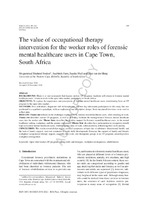The value of occupational therapy intervention for the worker roles of forensic mental healthcare users in Cape Town, South Africa
Date
2021Author
Soeker, Mogammad Shaheed
Hare, Saabirah
Mall, Saadia
van der Berg, Jean
Metadata
Show full item recordAbstract
BACKGROUND: There is a void in research that focuses on how OT programs facilitate self-esteem in forensic mental healthcare users' return-to-work in the open labor market, particularly in South Africa. OBJECTIVE: To explore the experiences and perceptions of forensic mental healthcare users, transitioning from an OT program to the open labor market. METHODS: Five individuals, diagnosed with Schizophrenia, and two key informants participated in this study that was positioned in a qualitative paradigm, with an exploratory and descriptive design. Semi-structured interviews were used to collect data. RESULTS: Theme one reflects on the challenges experienced by forensic mental healthcare users, when returning to work. Theme two describes various OT programs, as well as how they facilitate the reintegration of forensic mental healthcare users into the worker role. Theme three describes the positive support for forensic mental healthcare users, in the mental healthcare setting, workplace, and the greater community. Theme four describes how participation in occupation installs hope in forensic mental healthcare users, reinforcing the value of work, while positively influencing their work identity. CONCLUSION: The results revealed that stigma, residual symptoms, relapse due to substance abuse/mental health, and the lack of family support, were not be conducive to work skills development. However, the support of family and friends, workplace occupational therapy support, assembly line work, and therapeutic groups in an OT program, ensured positive workplace reintegration.

